BURNING END
By RUTH RENDELL A crime story
AFTER SHE had been doing it for a year, it occurred to Linda that looking after Betty fell to her lot because she was a woman. Betty was Brian's mother, not hers, and Betty had two other children, both sons, both unmarried men. No one had ever suggested that either of them should take a hand in looking after their mother. Betty had never much liked Linda, had sometimes hinted that Brian had married beneath him, and once, in the heat of tem- per, said that Linda was 'not good enough' for her son, but still it was Linda who cared for her now. Linda felt a fool for not hav- ing thought of it in these terms before.
She knew she would not get very far talk- ing about it to Brian. Brian would say and did say — that this was women's work. A man couldn't perform intimate tasks for an old woman; it wasn't fitting. When Linda asked why not, he told her not to be silly, everyone knew why not.
`Suppose it had been your dad that was
left, suppose he'd been bedridden, would I have looked after him?'
Brian looked over the top of his evening paper. He was holding the remote in his hand but he didn't turn down the sound. `He wasn't left, was he?'
`No, but if he had been?'
`I reckon you would have. There isn't anyone else, is there? It's not as if the boys were married.'
Every morning after Brian had gone out into the farmyard and before she went to work, Linda drove down the road, turned left at the church into the lane, and after a mile came to the small cottage on the large piece of land where Betty had lived since the death of her husband 12 years before. Betty slept downstairs in the room at the back. She was always awake when Linda got there, although that was invariably before seven-thirty, and she always said she had been awake since five.
Linda got her up and changed the incon- tinence pad. Most mornings she had t, change the sheets as well. She waslio, Betty, put her into a clean nightdress all; clean bedjacket, socks and slippers an d while Betty shouted and moaned, lifted an shoved her as best she could into the army chair she would remain in all day. Then ci was breakfast. Sweet milky tea and bins and butter and jam. Betty wouldn't use tir feeding cup with the spout. What did Lin° think she was, a baby? She drank fretn„oa cup and, unless Linda had remembered 't cover her up with the muslin squares tiln, had indeed once had their use for babiets: the tea-would go all down the clean nig') dress and Betty would have to be change again. After Linda had left her, the dist° nurse would come, though not every dad The meals-on-wheels lady would came and give Betty her midday dinner, bits III pieces in foil containers, all labelled 91.10t the names of their contents. At some P°1 Brian would come. Brian would 'look in'. Not to do anything, not to clear anything away or make his mother a cup of tea or run the vacuum-cleaner around but to sit in Betty's bedroom for ten minutes, smoking a cigarette and watching television. Per- haps once a month, the brother who lived two miles away would come for ten min- utes and watch television with Brian. The other brother, the one who lived ten miles away, never came at all except at Christ- mas.
Linda knew if Brian had been there by the smell of smoke and the cigarette-end stubbed out in the ashtray. But even if there had been no smell and no stub she would have known, because Betty always told her. Betty thought Brian was a saint to spare a moment away from the farm to visit his old mother. She could no longer speak distinctly but she was articulate on the sub- ject of Brian, the most perfect son any woman ever had.
It was about five when Linda got back there. Usually the incontinence pad needed changing again and often the nightdress too. Considering how ill she was and par- tially paralysed, Betty ate a great deal. Linda made her scrambled egg or sardines on toast. She brought pastries with her from the cake shop or, in the summer, strawberries and cream. She made more tea for Betty, and, when the meal was over, somehow heaved her back into that bed. The bedroom window was never opened. Betty wouldn't have it. The room smelt of urine and lavender, camphor and meals- on-wheels, so every day on her way to work Linda opened the window in the front room and left the doors open. It didn't make much difference but she went on doing it. When she had got Betty to bed, she washed the dishes and teacups and put all the soiled linen into a plastic bag to take home. The question she asked Betty before she left had become meaningless because Betty always said no, and she hadn't asked tt once since talking to Brian about whose job it was to look after his mother, but she asked it now. :Wouldn't it be better if we moved you in with us, mum?' Betty's hearing was erratic. This was one of her deaf days. `What?'
`Wouldn't you be better-off coming to live with us?' I'm not leaving my home till they carry me out feet first. How many times do I have to tell you?' Linda said she would see her in the morning. Looking rather pleased at the Prospect, Betty said she would be dead by the morning. `Not you, said Linda, which was what she always said, and so far she had always been right. She went into the front room and closed the window. The room was furnished in a Way which must have been old-fashioned even when Betty was young. In the centre of it was a square dining table, around which stood six chairs with seats of faded green silk. There was a large sideboard but no armchairs, no small tables, no books and no lamps but the central light which, enveloped in a shade of parchment panels stitched together with leather thongs, was suspended directly over the glass vase that stood on a lace mat in the absolute centre of the table.
For some reason, ever since the second stroke had incapacitated Betty, all the post, all the junk mail and every freebie news- sheet that was delivered to the cottage ended up on this table. Every few months it was cleared away, but this hadn't been done for some time, and Linda noticed that only about four inches of the glass vase now showed above the sea of paper. The lace mat was not visible at all. She noticed something else as well.
It had been a warm sunny day, very warm for April. The cottage faced south and all afternoon the sunshine had poured through the window, was still pouring through the window, striking the neck of the vase so that the glass was too bright to look at. Where the sun-struck glass touched a sheet of paper a burning had begun. The burning glass was making a dark charred channel through the sheet of thin printed paper.
Linda screwed up her eyes. They had not deceived her. That was smoke she could see. And now she could smell burning paper. For a moment she stood there, mar- velling at this phenomenon which she had heard of but had never believed in. A mag- nifying glass used to make boy scouts' fires, she thought, and somewhere she had read of a forest burnt down through a piece of glass left in a sunlit glade.
There was nowhere to put the piles of paper, so she found another plastic bag and filled that. Betty called out something but it was only to know why she was still there. Linda dusted the table, replaced the lace mat and the glass vase and, with a bag of soiled linen in one hand and a bag of waste paper in the other, went home to do the washing and get an evening meal for Brian and herself and the children.
The incident of the glass vase, the sun and the burning paper had been so inter- esting that Linda meant to tell Brian and Andrew and Gemma all about it while they were eating. But they were also watching the finals of a quiz game on television and hushed her when she started to speak. The opportunity went by and somehow there was no other until the next day. But by that time the sun and the glass setting the paper on fire no longer seemed so remarkable, and Linda decided not to mention it.
Several times in the weeks that followed Brian asked his mother to come and live with them at the farm. Betty responded very differently from when Linda asked her. Brian and his children, Betty said, shouldn't have to have a useless old woman under their roof; age and youth were not meant to live together, though nobody appreciated her son's generosity in asking her more than she did. Meanwhile Linda went on going to the cottage and looking after Betty, and cleaning the place on Sat- urdays and doing Betty's washing.
One afternoon while Brian was sitting with his mother and smoking a cigarette,
the doctor dropped in to pay his twice-year- ly visit. He beamed at Betty, said how nice it was for her to have her family around her, and on his way out told Brian it was best for the old folks to end their days at home whenever possible. He made no com- ment on the cigarette. Brian must have picked up a pile of junk mail from the door- mat and the new phone book from outside the door, for all this was lying on the table in the front room when Linda arrived at ten to five. The paper had accumulated during the past weeks, but when she went to look for a plastic bag she saw that the stock had been used up. She made a mental note to buy some more and, in the meantime, had to put the soiled sheets and Betty's two wet nightdresses into a pillowcase to take home. The sun wasn't shining, it had been a dull day and the forecast was for rain, so there was no danger from the conjunction of the glass vase with the piles of paper. It could safely remain where it was. On her way home it occurred to Linda that the simplest solution was to remove, not the paper but the vase. Yet, when she went back next day, she didn't remove the vase. It was a strange feeling she had that, if she moved the vase on to the mantelpiece, say, or the sideboard, she would somehow have closed a door or missed a chance' Once she had moved it, she would never be able to move it back again, for, though she could easily have explained to anyone vITIV, she had moved it from the table, she would never be able to say why she had put it baet These thoughts made her feel uneasy arl she put them from her mind. Linda bought a pack of fifty black plastic, sacks. Betty said it was a wicked waste 01 money. In the days when she had been Of and about she had been in the habit oi burning waste paper. All leftover food ail, cans and bottles got mixed up together and went out for the dustman. Betty had neveer heard of the environment. When Linda insisted, one hot day in July, on °Paling the bedroom windows, Betty said she was freezing and Linda was trying to kill her; Linda took the curtains home and washed them but she didn't open the bedroom 1011, dow again: it wasn't worth it, it caused too
much trouble.
But when Brian's brother Michael got engaged, she did ask if Suzanne would take her turn looking after Betty once they were back from their honeymoon. `You couldn't expect it of a young girl like her,' Brian said.
`She's twenty-eight,' said Linda.
`She doesn't look it.' Brian switched on the television. 'Did I tell you Geoff's been made redundant?'
`Then maybe he could help out with Betty if he hasn't got a job to go to.' Brian looked at her and shook his head gently. 'He's feeling low enough as it is. It's a blow to a man's pride, that is, going on the dole. I couldn't ask him.' Why does he have to be asked? Linda thought. It's his mother. The sun was already high in the sky when she got to the cottage at seven-thirty next morning, already edging round the house to pene- trate the front-room window by ten. Linda put the junk mail on the table and took the letter and the postcard into the bedroom. Betty wouldn't look at them. She was wet through and the bed was wet. Linda got her op and stripped off the wet clothes, wrap- Plug Betty in a clean blanket because she said she was freezing. When she was washed and in her clean nightdress, she wanted to talk about Michael's fiancé. It was one of her articulate days. , Dirty little trollop,' said Betty. 'I remem- ber her when she was fifteen. Go with any- one, she would. There's no knowing how many abortions she's had; messed all her insides up, I shouldn't wonder.' She's very pretty, in my opinion,' said Linda, 'and a nice nature.'
Handsome is as handsome does. It's all that make-up and hair dye as has entrapped my poor boy. One thing, she won't set foot in this house while I'm alive.' Linda opened the window in the front room. It was going to be a hot day, but breezy. The house could do with a good draught of air blowing through to freshen R. She thought, I wonder why no one ever put flowers in that vase, there's no point in a vase without flowers. The letters and envelopes and newsprint surrounded it so
that it no longer looked like a vase but like a glass tube inexplicably poking out between a stack of paper and a telephone directory.
Brian didn't visit that day. He had start- ed harvesting. When Linda came back at five, Betty told her Michael had been in. She showed Linda the gift of chocolates that were his way of 'soft-soaping' her, Betty said. Not that a few violet creams had stopped her speaking her mind on the sub- ject of that trollop. The chocolates had gone soft and sticky in the heat. Linda said she would put them in the fridge, but Betty clutched the box to her chest, saying she knew Linda, she knew her sweet tooth, if she let that box out of her sight she'd never see it again. Linda washed Betty and changed her. While she was doing Betty's feet, rubbing cream round her toes and pow- dering them, Betty struck her on the head with the bedside clock, the only weapon she had to hand.
`You hurt my toe,' said Betty. 'You hurt me on purpose.'
`No, I didn't, mum. I think you've broken that clock.' `You hurt me on purpose because I wouldn't give you my chocolates my son brought me.'
Brian said he was going to cut the field behind the cottage next day. Fifty acres of barley and he'd be done by mid-afternoon, if the heat didn't kill him. He could have seen to his mother's needs, he'd be practi- cally on the spot, but he didn't offer. Linda wouldn't have believed her ears if she'd heard him offer.
It was hotter than ever. It was even hot at seven-thirty in the morning. Linda washed Betty and changed the sheets. She gave her cereal for breakfast and a boiled egg and toast. From her bed, Betty could see Brian going round the barley field on the combine and this seemed to bring her enormous pleasure, though her enjoyment was tempered with pity.
`He knows what hard work is,' Betty said, `he doesn't spare himself when there's a job to be done,' as if Brian was cutting the fifty acres with a scythe instead of sitting up there in a cabin with twenty kingsize and a can of Coke and the Walkman on his head playing Beatles' songs from his youth.
Linda opened the window in the front room very wide. The sun would be round in a couple of hours to stream through that window. She adjusted an envelope on the top of the pile, moving the torn edge of its flap to brush against the glass vase. Then she moved it away again. She stood, look- ing at the table and the papers and the vase. A brisk draught of air made the thin- ner sheets of paper flutter a little. From the bedroom she heard Betty call out, through closed windows, to a man on a combine a quarter of a mile away, 'Hallo, Brian, you all right then, are you? You keep at it, son. That's right, you got the weather on your side.'
One finger stretched out, Linda lightly poked at the torn edge of the envelope flap. She didn't really move it at all. She turned her back quickly. She marched out of the room, out of the house, to the car.
The fire must have started somewhere around four in the afternoon, the hottest
part of that hot day. Brian had been in to see his mother when he had finished cut- ting the field at two. He had watched tele- vision with her and then she said she wanted to have a sleep. Those who know about these things said she had very likely died from suffocation without ever waking. That was why she hadn't phoned for help, though the phone was by her bed.
A farm-worker driving down the lane called the fire brigade. They were volun- teers whose headquarters was five miles away and they took twenty minutes to get to the fire. By then Betty was dead and half the cottage destroyed. Nobody told Linda, there was hardly time: when she got to Betty's at five it was all over and Brian and the firemen were standing about, poking at the wet black ashes with sticks.
The will was a surprise. Betty had lived in that cottage for years without a washing- machine or a freezer and her television set was rented by Brian. The bed she slept in was her marriage bed, new in 1947; the cot- tage hadn't been painted since she moved there and the kitchen had last been refitted just after the war. But she left what seemed an enormous sum of money. Linda could hardly believe it. A third was for Geoff, a third for Michael and the remaining third as well as the cottage, or what was left of it, for Brian.
The insurance company paid up. It was impossible to discover the cause of the fire. Something to do with the great heat, no doubt, and the thatched roof and the ancient electrical wiring. Linda, of course, knew better, but she said nothing. She kept what she knew and let it fester inside her, giving her sleepless nights and taking away her appetite.
Brian cried noisily at the funeral. All the brothers showed excessive grief and no one told Brian to pull himself together or be a man, but put their. arms round his shoul- ders and said what a marvellous son he'd been and how he'd nothing to reproach himself with. Linda didn't cry, but soon after went into a depression from which nothing could rouse her, not the doctor's tranquillisers, nor Brian's promise of a slap-up holiday somewhere, even abroad if she liked, nor people telling her Betty hadn't felt any pain but had just slipped away in her smoky sleep.
An application to build a new house on the site of the cottage was favourably received by the planning authority and per- mission was granted. Why shouldn't they live in it, Brian said, he and Linda and the children? The farmhouse was ancient and awkward, difficult to keep clean, just the sort of place Londoners would like for a second home. How about a modern house, he said, with everything you want, two bathrooms, say, and a laundry room and a sun-lounge? Design it yourself and don't worry about the cost, he said, for he was concerned for his wife who had always been so practical and efficient, as well as easy-going and persuadable, but was now a miserable, silent woman.
Linda refused to move. She didn't want a new house, especially a new house on the site of that cottage. She didn't want a holi- day or money to buy clothes. She refused to touch Betty's money. Depression had forced her to give up her job but, although she was at home all day and there was no old woman to look after every morning and every evening, she did nothing in the house, and Brian was obliged to get a woman in to cleari.
`She must have been a lot fonder of mum than I thought,' Brian said to his brother Michael. 'She's always been one to keep her feelings bottled up, but that's the only explanation. Mum must have meant a lot more to her than I ever knew.'
`Or else it's guilt,' said Michael, whose fiancé's sister was married to a man whose brother was a psychotherapist.
`Guilt? You have to be joking. What's she got to be guilty about? She couldn't have done more if she'd been mum's own daughter.'
`Yeah, but folks feel guilt over nothing when someone dies, it's a well-known fact.'
`It is, is it? Is that what it is, doctor? Well, let me tell you something. If anyone ought to feel guilt it's me. I've never said a
word about this to a soul. Well, I couldn't, could I, not if I wanted to collect the insur- ance, but the fact is it was me set that place on fire.'
`You what?' said Michael.
`I don't mean on purpose. Come on' what do you take me for, my own brother? And I don't feel guilty, I can tell you. don't feel a scrap of guilt; accidents will happen and there's not a thing you can do about it. But when I went in to see minn that afternoon I left my cigarette burning on the side of the chest of drawers. YOU know how you put them down, with the burning end stuck out. Linda'd taken away the damned ashtray and washed it or seine' thing. When I saw mum was asleep, I just crept out and left that fag-end burning. Without a backward glance.'
Awed, Michael asked in a small voice, `When did you realise?'
`Soon as I saw the smoke, soon as I sawi the fire brigade. Too late then, wasn't t, I'd crept out of there without a backward glance.'

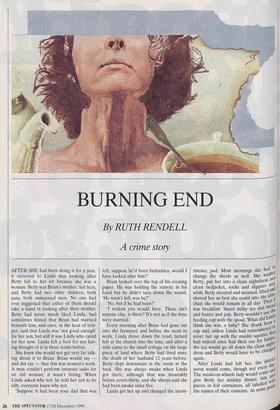
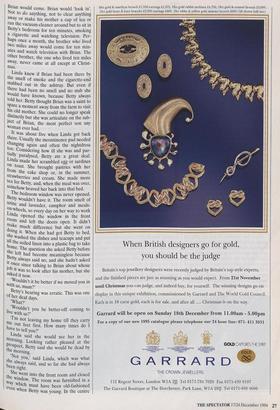
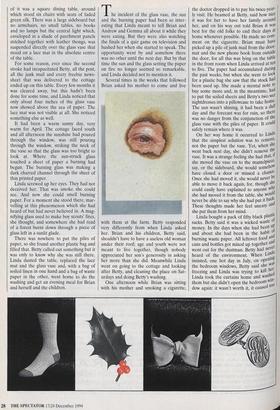
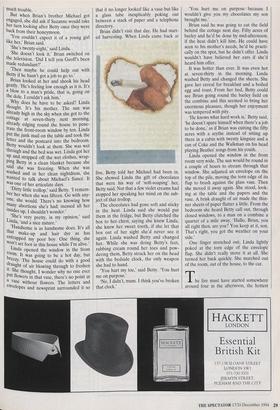
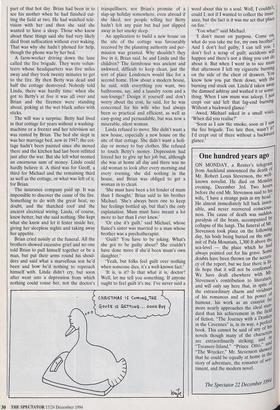








































































































 Previous page
Previous page